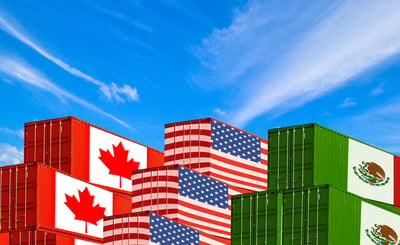Make qualification easier by considering your costs
Your manufacturing costs are greater than 50% of the total sales price of your manufactured goods. Do they automatically qualify for USMCA/CUSMA?
Get qualified for USMCA/CUSMA
Understanding what qualifies for USMCA/CUSMA is a tricky game. The rules of origin are complex and based on the tariff classification of the finished goods. We are also only three years into USMCA/CUSMA, and if you were used to NAFTA’s rules, you may still be adjusting to the changes this new agreement has brought. 
Seen in this light, the question is fair. If your manufacturing costs are greater than 50% of the total sales price of the manufactured goods, don’t they automatically qualify for USMCA/CUSMA?
First off, understand that nothing automatically qualifies for USMCA/CUSMA, although there are some unique rules for certain products that may potentially reduce the burden of qualification. Generally speaking, the domestic cost or regional value content (RVC) threshold can be as low as 25% to as high as 75%, depending on the products.
Keep in mind, even if goods were produced entirely in the same country as either importer or an exporter, they may still be produced with materials sourced from other nations. In order to determine if your product qualifies for preferential tariff treatment under USMCA/CUSMA in the importing country, you must apply the Product-Specific Rule of Origin (PSRO) to each product category.
In many cases, both the substantial transformation test and the RVC test must be met to qualify the goods as having met the rules of origin. For example, certain rubber and articles containing rubber may qualify via either the transformation test or the RVC test. If the goods pass the substantial transformation test then you're good to go. If they do not, the RVC test is an opportunity to look at the domestic costs incurred in manufacturing the product.
Sometimes only the substantial transformation test is necessary, with no allowance for the percentage of the domestic cost. For example, certain vegetable textile fibres, notably paper yarn and woven fabrics of paper yarn that are classified under Heading 53.01 require a "change to heading 53.01 through 53.05 from any other chapter." This means that no matter how much value you add to the product if it contains materials classified within Chapter 53, your goods do not qualify. While this is generally the result, there are provisions to help. If the negligible amounts of all non-originating materials used in the production of the good do not undergo an applicable change in tariff classification, the overall product may still qualify.
Still, understood this way, it’s clear that having manufacturing costs greater than 50% may not be enough to allow your goods to qualify—and there is too much at stake to assume otherwise.
Best practices for importers
When it comes to the murky waters of USMCA/CUSMA and goods qualification, here are some tips to help you stay afloat:
- Always request a USMCA/CUSMA certification from your material’s supplier(s). (Making this request part of your purchase order agreement can prove helpful.)
- Ensure you have a complete list of all materials that go into the manufacture of the finished goods.
- Once the above information is obtained, seek help from an experienced consultant.
Beyond these tips, here are a few more best practices to keep in mind:
- Educate yourself and your appropriate staff on the rules of origin for your product line.
- If you know that they are educated in this area, ask your domestic suppliers who provide certifications. (Some suppliers fail to do due diligence when it comes to ensuring they are qualifying products under the applicable PSRO.)
- Never assume any product purchased within North America has been made in North America.
How Cole helps
Cole provides assistance to exporters into or out of Canada with the following:
- qualifying their finished goods under the appropriate PSRO;
- contacting the manufacturers’ suppliers and assisting them where needed;
- assisting suppliers in determining the true country of manufacture of materials;
- undertaking the certification from raw materials to the finished goods by reviewing and applying the PSRO to the Bill of Material for the subject goods.
You're never lost at sea with Cole International on your side. Customs and trade consulting is what we’ve been doing for over half a century. Connect with us today.

